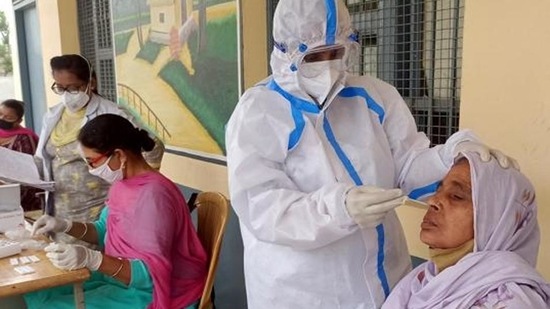Stricter airport SOPs, focus on hot spots in new Omicron plan
The rules are meant to contain the spread of Omicron variant, which was dubbed a variant of concern (VOC) by the World Health Organization on Friday after early evidence showed it could be more transmissible, and resistant to immunity from a past infection or vaccination.
People entering India from “at risk” countries, including all of Europe, will need to take a test for Covid-19 upon arrival at the airport, according to new guidelines issued by the government on Sunday, which removed the exemption for vaccinated people who could leave and monitor their health on their own.

The rules are meant to contain the spread of Omicron variant, which was dubbed a variant of concern (VOC) by the World Health Organization on Friday after early evidence showed it could be more transmissible, and resistant to immunity from a past infection or vaccination.
Countries classified as “at risk” include all European Union nations, the UK, South Africa and New Zealand. At least nine countries have confirmed detecting Omicron infections as of Sunday.
Travellers from the at risk countries who test positive will be taken to a medical facility for isolation, where they will need to stay till they test negative if they indeed are infected by the VOC. If they are infected by any of the other variants, their release will be at the discretion of a doctor based on their condition.
For people who test negative after coming from the listed countries, they will need to be in home quarantine and take another test on the eighth day. If they are positive, they will need to report to the Covid-19 helpline, the guidelines said.
“Children under 5 years of age are exempted from pre- and post- arrival testing. However, if found symptomatic for Covid-19 on arrival or during home quarantine period, they shall undergo testing and treated as per laid down protocol,” the guidelines said.
Additionally people will need to declare their travel history for the 14 days prior to their arrival and show evidence that they tested negative in the 72 hours before they boarded their flight for India.
Experts say screening at the entry points will be critical in identifying those infected with the new variant. “We have to prevent importation of a case and screening at entry points will play a crucial role,” said Jacob John, former head virology department, CMC, Vellore.
Earlier, officials said they will review the decision to allow regular overseas flights and will establish a standard operating procedure on testing and surveillance.
The country is also gearing up to manage the spread of the disease should there be a surge, official said.
A meeting chaired by home secretary Ajay Kumar Bhalla on Sunday discussed the global situation and explored the various ways the new variant can be contained through strict screening and preventive measures, a ministry spokesperson said.
The federal health ministry asked state authorities to closely monitor clusters of all positive cases, test everyone in disease hot spots and quickly genome sequence samples to determine the variant, according to people familiar with the development.
“ln view of the possible threat that this VoC (variant of concern) can pose to the nation, it is imperative that the intensive containment, active surveillance, increased coverage of vaccination and Covid Appropriate Behaviour must be enforced in the field in a very proactive manner to effectively manage this VoC,” health secretary Rajesh Bhushan wrote in a letter on Saturday to the state governments.
After 20 months since the outbreak, the civil aviation ministry had said on Friday that it will allow scheduled international flights from December 15 to and from all countries considered ‘not at risk’. The ministry had said passengers from nations in the ‘at risk’ category will have to be tested and monitored.
Instances of the new variant have now been reported from Botswana, Hong Kong, South Africa, the UK, Australia, Czech Republic, Italy, Germany, Israel, and the Netherlands, among others. All of these countries are identified as at risk by India.
Authorities will further strengthen and intensify genomic surveillance for variants, and health officials at airports and ports will be sensitised for stricter supervision of testing protocol at entry points, the home ministry said in a statement.
“The government has already heightened surveillance at points of entry, especially directing rigorous screening and testing for passengers coming from those countries where this new variant has been identified,” a central government official said on condition of anonymity. “A blanket travel ban may not be declared but the government could revisit the recently announced schedule for starting commercial international flights.”
Several high-level meetings were held by government functionaries, including one by Prime Minister Narendra Modi on Saturday, after news of discovery of the new variant. The Omicron, or B.1.1.529, variant has a large number of mutations, some of which are concerning, the global health agency said. Preliminary evidence suggested an increased risk of reinfection with this variant, it said.
India registered 8,774 new cases of Covid-19 on Sunday and 621 related deaths in the past 24 hours, with active cases of Covid-19 at 105,691 remaining the lowest in 543 days, health ministry data showed.
“Improving vaccination coverage is another option as vaccine would provide some protection in case there is immune-evasive response,” John added.
India has fully immunised over 440 million people, or 46.8 % of its adult population, while another 343 million people, or 36.5 % of the country’s adults, have been partially vaccinated with one of the approved vaccines.
Get Current Updates on India News, Lok Sabha Election 2024 live, Infosys Q4 Results Live, Elections 2024, Election 2024 Date along with Latest News and Top Headlines from India and around the world.





